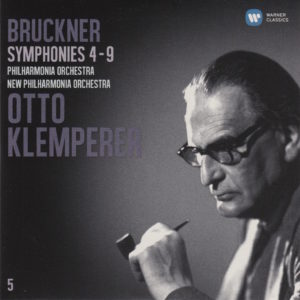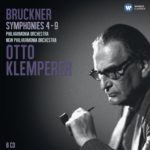 This morning, I am listening to Anton Bruckner’s Symphony No. 8 in C Minor (WAB 108), interpreted by German-born conductor and composer Otto Klemperer (1885-1973).
This morning, I am listening to Anton Bruckner’s Symphony No. 8 in C Minor (WAB 108), interpreted by German-born conductor and composer Otto Klemperer (1885-1973).
Prior to this Bruckner project, I had never heard of Otto Klemperer – although I had heard of his son, actor Werner Klemperer, most famous for his portrayal of Col. Klink, Kommandant of Stalag 13 in the 1960s TV series Hogan’s Heroes.
The first time I heard Otto Klemperer was on Day 23, Symphony No. 4.
Then again on Day 31, Symphony No. 5.
Then again on Day 39, Symphony No. 6.
 Then again on Day 47, Symphony No. 7.
Then again on Day 47, Symphony No. 7.
On at least the first two of those days, I posted background information on Klemperer and his orchestra. I shan’t do that again today. If you want to know more about the famed German Maestro, let your mouse do the clicking over to one or both of those days.
Here are the objective aspects of today’s recording:
Bruckner’s Symphony No. 8 in C Minor (WAB 108), composed 1884–1892
Otto Klemperer conducts
Klemperer used the “1890 version, ed. Nowak,” according to the liner notes
New Philharmonia Orchestra plays
The symphony clocks in at 84:15 (on two CDs – 64:49 on CD 1 and 19:26 on CD 2)
This was recorded in Kingsway Hall, London, England, on October 29 & 30 and November 2-4, 10, 11 & 14 1970 (talk about cobbling together a performance!)
Klemperer was 85 when he conducted it
Bruckner was 68 when he finished composing it
This recording was released on the Warner Classics label
 Bruckner wrote his symphonies in four movements. The time breakdown of this one (Symphony No. 8 in C Minor), from this particular conductor (Klemperer) and this particular orchestra (New Philharmonia Orchestra) is as follows:
Bruckner wrote his symphonies in four movements. The time breakdown of this one (Symphony No. 8 in C Minor), from this particular conductor (Klemperer) and this particular orchestra (New Philharmonia Orchestra) is as follows:
I. Allegro moderato………………………………………………………………………………..17:56
II. Adagio. Sehr feierlich und sehr langsam…………………………………………..19:53
III. Scherzo. Sehr schnell………………………………………………………………………..27:00
IV. Finale. Bewegt, doch nicht schnell……………………………………………………19:38
Total Time: 84:15
Okay. Now, here are the subjective aspects of today’s recording:
My Rating:
Recording quality: 4
Overall musicianship: 5
CD liner notes: 2 (typically thin Warner Classics fare – very short essays about Klemper and Bruckner)
How does this make me feel: 3
Eighty-five? Klemperer was 85 when he conducted this performance! That may make him one of the oldest conductors to which I’ve listened in the last seven months. That, in itself, is amazing. In this case, I was alive when Otto Klemperer was, just as he was alive when Bruckner was. (That means absolutely nothing of significance. I just like to put thing in context.)
Not only that, but Maestro Klemperer lived just three years after this performance. (He died in 1973.)
Eighty-four minutes is a long time. But it’s not terribly uncommon for one of Bruckner’s symphonies, especially the Eighth. That’s about average, give or take.
The recording is – as I’ve discovered with this Klemperer box set on the Warner Classics label – superb. Rich, spacious, three dimensional, clear, and compelling. I have no idea how the Warner Classics label pulled this off. It hasn’t mattered if the recording is 60 years old, or 47. It’s been uniformly delightful.
The performance itself is superb – although I’m not quite sure how it’s possible to cull a live recording from over a week’s worth of performances. I’m not kidding. This was recorded over the following time period:
October 29 & 30 and November 2-4, 10, 11 & 14 1970
What does that mean I’m hearing? How much from each day is in this performance? And, at that point, is this really a performance? Or is it some kind of Frankenstein monster pieced together from parts here and parts there?
At some point, it ceases to be one thing and becomes many – the sum of its parts.
I wonder about the integrity of this recording. I feel manipulated somehow.
Am I wrong to feel that way?
If Celibidache is the king of In the Moment recording, let the chips fall where they may, then this Klemperer recording, surely, has to be the polar opposite.
That bothers me.
Another thing that irks me a bit with this performance is the Scherzo is played more slowly than other performances. It seems to drag, in fact.
The Scherzo to Bruckner’s Eighth is one of the Wonders of the World. Yet, here, in the hands of Klemperer it becomes something else. Not necessarily bad. And – for all I know – more akin to what Bruckner intended, tempo-wise. Yet, something feels amiss about this interpretation. It may be right on paper. But it’s wrong to my ears.
Compare this to Barenboim’s interpretation from the Berliner Philharmoniker box set (Day 49).
Klemper is slower, almost somber by comparison.
Or Barenboim is reckless with it. I can’t tell.
I’m not a musicologist.
I just know what I like.
And I prefer a bombastic Scherzo.
The Adagio from Klemperer is incredibly somber, to my ears. It’s a beautiful, lush piece of music, to be sure. But it’s played with a reverence than gives it a whole different feel. More emotional, perhaps.
The Finale suffers from (is enhanced by?) this same interpretation.
Under Barenboim, for example, it is like a charging stallion – sparks flying from its hooves on the cobblestones, ears pinned back by the wind.
Under Klemperer, this piece of music sounds more like a resolute death march.
Triumphant, in Barenboim’s hands.
Stoic, in Klemperer’s.
Again, I have no clue which one is played closer to the tempo noted by the composer himself.
All I know is what I hear now.
These are two very different interpretations (Barenboim’s and Klemperer’s).
In fact, I don’t recall hearing this tempo from any other conductor in this leg of my Bruckner journey.
If this is all I had to go by, if this is the only performance I’d ever heard of Bruckner’s Eight, I might have though it was swell. But I’ve heard dozens of others. And this one stood out as being the slowest of them all.
I don’t know what I think about this.
My first thought is, “Yuck.”
My second thought is, “Yuck.”
I don’t have a third thought yet.
